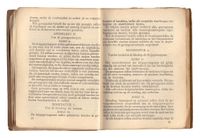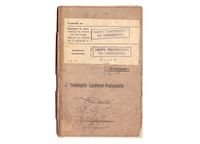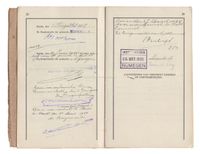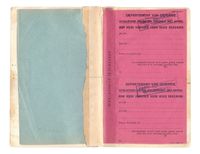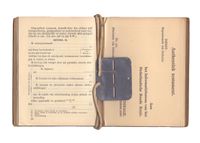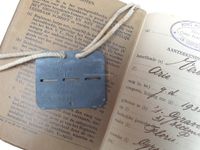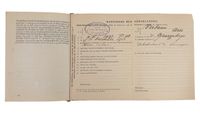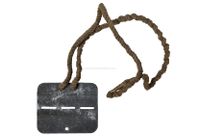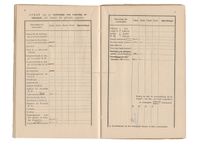War pocket books and Identification tags of the "Korps Pontonniers and Torpedisten".
War pocketbook ( oorlogszakboekje ) of conscript private Titte Wijbrands.
Here you can see a war pocketbook ( or oorlogszakboekje ) of conscript private Titte Wijbrands. He was called up as an ordinary conscript to the Corps of Pontonniers and Torpedisten in 1934. Titte was born on March 20, 1914, in Stavoren. His father Pieter Wijbrands was a stoker. It is possible that his son also became a stoker and was therefore assigned to the Corps of Pontonniers and Torpedisten. The corps had a rich presence of military personnel with a background in maritime affairs. The service record of conscript private Wijbrands is unknown. It is unclear whether he was in active service in May 1940, but it is highly likely.
The war pocketbook was issued to every military personnel. Along with it, the soldier was also given an identification tag to wear around the neck. The front of the identification tag displayed the birthplace, birth date, and conscription number of the soldier, while the back showed their name. The pocketbook contained additional information. On the first page of the pocketbook, there were general details about the soldier and their parents. The second page included some personal information of the soldier, such as clothing sizes, blood type, and any vaccinations. Page three provided space for notes about injuries, death, and burial location. Pages 4 to 51 contained regulations regarding the rights and obligations of the soldier when wounded, captured as a prisoner of war, or employed by an enemy power. Following that, there were pages with templates for recording a will. Finally, at the back of the pocketbook, there were message cards concerning injured, sick, or deceased individuals from the Royal Army in a state of war. These were to be filled out and sent to the information bureau of the Red Cross. If the soldier were to fall in combat, the pocketbook and identification tag would be collected by the Red Cross for processing, burial, and potential repatriation of the fallen.
What is remarkable about this war pocketbook are the stamps of the Corps of Pontonniers and Torpedisten - School Company Pontonniers. Since the training depot of the Corps of Pontonniers and Torpedisten was located in the Benthien Barracks in Dordrecht, and the school company was also housed in this barracks, Pontonnier Titte Wijbrands definitely spent the time of his training as a pontonnier in Dordrecht.
The pocketbook also contains a document with songs for military gatherings.
Military Pocketbook of Sergeant P.G.J. Duits - Landweer ( Reserve )Pontonniers.
Below you will find the Military pocketbook of Sergeant Petrus Gijsbertus Johannes Duits. Mr. Duits was born on July 20, 1890, in Valburg (Gelderland) as the son of Nicolaas Duits and Berdina Laks. He was a skipper by profession. On March 3, 1910, Petrus Duits was assigned to the Corps of Pontonniers as a conscript of the 1910 selection from the municipality of Valburg. At that time, the corps was still an independent corps under the Artillery, until 1927. His service record in the registries does not make it clear whether he enlisted in Dordrecht. However, this is likely since Dordrecht had been the station for maritime engineering soldiers since the 16th century. Between his enlistment date and 1914, he went on several leaves and returned each time. On August 1, 1914, he returned from a major leave during the mobilization call-up. It was necessary to maintain the neutrality of the Netherlands. On October 31, 1914, Mr. Duits was promoted to corporal, and on August 31, 1915, he became a sergeant. As of August 1, 1917, Mr. Duits transferred to the 2nd Landweer Company of Pontonniers in the Landweer District Nijmegen. A year later, on June 11, 1918, he transferred to the Landweer District Arnhem I. On October 1, 1919, Mr. Duits went on leave again as part of the demobilization. His pocketbook indicates that as of September 1, 1922, due to reorganization, he transferred to the Corps of Pontonniers and Torpedisten. In 1925, he received a stamp for the return of military goods in his pocketbook. Presumably, he still held some form of reserve role afterward. Interestingly, there is a travel booklet with vouchers for transportation via state reimbursement accompanying the pocketbook. The document indicates that in 1931, he was still part of the supplementary reserve. When the supplementary reserve of his weapon and selection took place by public notice, he could use the travel vouchers in the booklet to travel for free to his mobilization destination. This was the Pontonniers barracks in Dordrecht. The booklet is signed by a captain on March 27, 1931.
The travel voucher booklet accompanying the aforementioned pocketbook:
War pocketbook and identification tag for the Corps of Pontonniers and Torpedisten.
In the photos below, you can see the war pocketbook and identification tag of Arie Verbaan. Arie Verbaan was born on December 31, 1913, in The Hague. He was the son of Floris Verbaan and Clasina Groen and lived at the Urkschestraat number 2 in Scheveningen. After completing his education in primary school, he became a fisherman by profession. On February 16, 1933, Arie was drafted as a regular conscript into the Corps of Pontonniers and Torpedisten. He was assigned to the School Company of the Pontonniers in Dordrecht. On July 29, 1933, he went on extended leave. On September 13, 1937, he returned and after attending another exercise in Epe between September 20 and 24, he went on extended leave again on September 29. On August 29, 1939, as part of the General Mobilization, he returned. He remained in service until the outbreak of the war. His service record does not indicate his mobilization destination. Since there were over 1500 Pontonniers and Torpedisten in Dordrecht during May 1940, it is likely that Dordrecht was his destination. It is certain, however, that he experienced the events of May 1940 as a soldier because on May 24, 1940, he went on extended leave for the last time.
The war pocketbook is of the same type as the previously described war pocketbook of Titte Wijbrands. However, this war pocketbook includes his identification tag. The identification tag is made of zinc. It has his name, date of birth, place of birth, conscription number, and military unit stamped on it. The tag was worn around the neck with the help of a cord. In the war pocketbook, you can once again see the stamps of the School Company of the Pontonniers of the Corps of Pontonniers and Torpedisten.
Identification tag Gradus P. van den Berg - Corps of Pontonniers and Torpedisten.
Below you will find the identification tag of the private Gradus P. van den Berg. Van den Berg was born in Renkum on May 25, 1918. He served in the Corps of Pontonniers and Torpedisten in the conscription of 1938. His conscription number is P-27. This is a punched tag. Previous versions of the name tag were written with acid. Unfortunately, further information cannot be provided at this time as the request for the service record still needs to be made.
Pocketbook Gerrit Nagel - Corps of Pontonniers and Torpedisten.
Below you will find the military pocketbook of Gerrit Nagel, born on August 1, 1903, in Winschoten. At the time of the pocketbook's creation, Gerrit was unmarried and worked as an electrician. On May 12, 1922, he voluntarily enlisted as a combat engineer for a period of four years. He was registered for the conscription of 1923 in the municipality of Winschoten. On March 4, 1924, Gerrit was transferred to the Corps of Pontonniers and Torpedisten. He became a Torpedist Stoker on May 10, 1924, and was promoted to Corporal Stoker on August 10, 1925. On March 17, 1926, Gerrit reenlisted for a year, and then again on February 10, 1927, for a period of four years. On March 15, 1928, he was promoted to Corporal Machinedriver. In 1928, he was awarded the Watersnood Medal. Finally, on August 10, 1931, he was promoted to Sergeant Machinedriver, and on May 2, 1932, Gerrit was voluntarily connected to the army for an indefinite period of time. The last remarks in the pocketbook were written on December 18, 1933. Therefore, Gerrit Nagel served with the Corps of Pontonniers and Torpedisten at least until 1933.
War Pocketbook J.B. Bohré - Corps of Pontonniers and Torpedisten.
This war pocketbook below belonged to Johannes Bernardus Bohré. He was born on February 13, 1912, in Amsterdam. He was a waiter by profession. On February 24, Johannes was enlisted as a conscript from the municipality of Utrecht. He sailed on the Hr. Ms. Medusa from Vlissingen, a naval ship where he was probably detached. He may have initially been assigned to the navy as a conscripted soldier and later transferred to the Army Maritime Engineers. However, his war pocketbook is not a variant used by the navy. It appears that he joined the Army Maritime Engineers in Dordrecht in 1932. On August 14, Johannes Bohré went on extended leave. It is unknown which unit he was with during the May days of 1940. In the photo below, he is seen wearing a naval uniform. He may have been a "Torpedist" and thus dressed in a maritime uniform.
©2017-2025 :Https://www.Dordrechtindeoorlog.nl: ( There is a copyright on the content of this website. This content is not to be shared, duplicated or published withouth the explicit permission of the author of this website. If you have any requests you can email to: Info@Dordrechtindeoorlog.nl or look on : www.dordrechtindeoorlog.nl/termsofuseforthecontentonthiswebsite.






